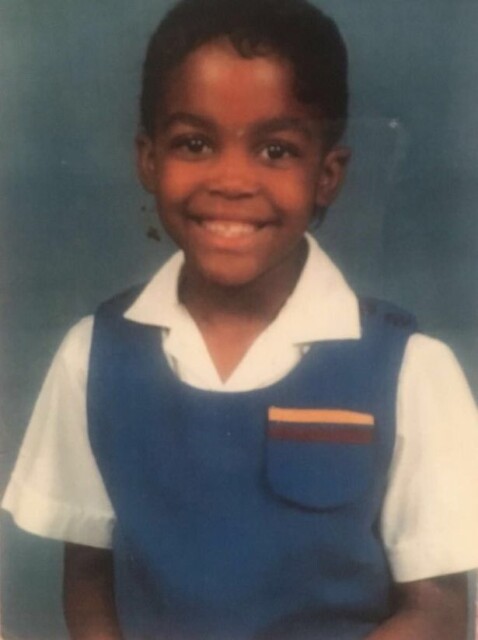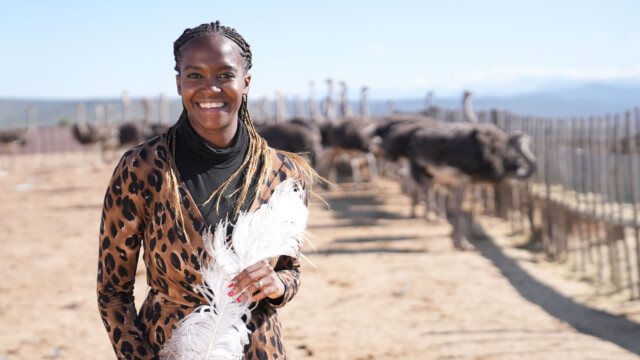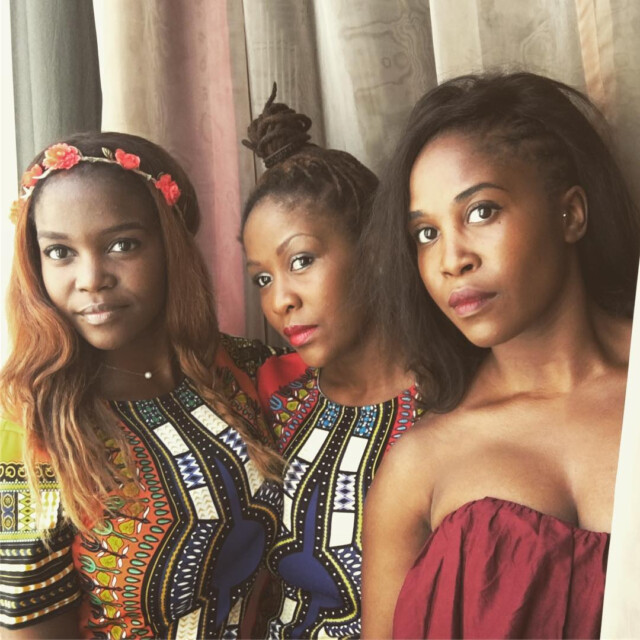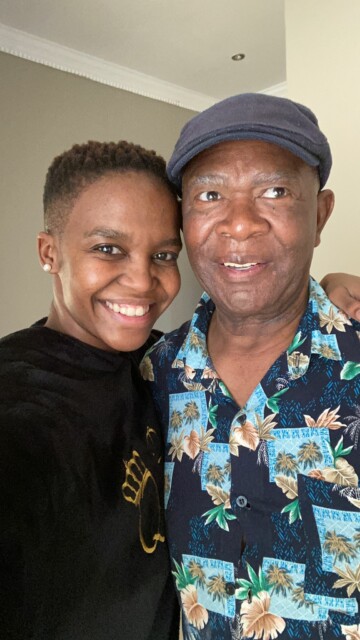SHE dazzled Strictly audiences with her sensational physique, dance moves and dresses – but Oti Mabuse’s roots couldn’t be further from the glamorous showbiz world she now enjoys.
In her new BBC1 documentary, Oti Mabuse: My South Africa, she returns to her homeland to see show how much it has changed in the ten years since she left to become a Latin and ballroom champion.
And in doing so, she ditched all the glitz she became associated with on the BBC1 dance show — revealing the real Oti for the first time.
She said: “All the sexiness and glamour isn’t me. That is my job, it’s not who I am. I just wanted to be myself and not look ‘prime time TV’ as you would normally see me.
“I love all the dresses and the hair and the make-up — maybe not the shoes — but only for a couple of hours.
“So I really enjoyed showing that other side of me . . . it was such a release and a relief because it was no longer about my face or my body. I felt free.”
After quitting Strictly earlier this year, Oti, 32, is still stunning viewers as a judge on ITV’s Dancing On Ice and The Masked Dancer.
But her new doc sees her return to a country where the only people who know her recall her as a young girl dancing on the pavement in a T-shirt.
Losing the glitz was also essential as she delves into the dark history of South Africa, which for decades was torn apart by apartheid, the system that saw a white minority rule and segregate the majority black population.
Bawled with tears
She looked at her own family, who worked hard to develop her dancing career. They suffered under the vile regime which lasted from 1948 up to the early Nineties.
In one scene her mother Dudu takes her to the first family home which Oti says symbolises the oppression black people endured.
It was where her parents lived with her two older sisters, Phemelo and Motsi, the latter now a champion dancer and Strictly judge.
It was there in these four-bedroomed “matchbox” houses in the townships that the government forced black people to live.
She was told by her mother that their only bathing facilities were plastic buckets filled with cold water.
Oti said: “There were moments like that when I bawled with tears.
“My parents were living in the north of the country and they were taken in the middle of the night and they were left in this random town with a tent.
“The government was actually trying to separate families. They’d take the mum and dad and leave the kids behind.
“And they’d sometimes give them the kids of another family and tell them to budge up. . . then they gave them these matchbox houses to build themselves.”


In the doc her father, Peter, is seen recalling how he was moved into townships like theirs while the white minority in the country took 85 per cent of the land.
He said: “We moved to this place in 1962, we were moved by the government trucks . . . I was 11 years old.
“I saw lots of tents, each family was given a tent, it didn’t matter how many children you had.”
Oti’s parents worked a string of jobs to get them better housing and help all three of their daughters achieve an education and pursue their dreams.
After taking a degree in engineering, Oti pursued her dream of being a champion dancer, something she’d competed in as a child.
She won the South African Latin American Championship eight times, before moving to Germany where she appeared on their version of Strictly, called Let’s Dance.
Then, in 2015, she signed up for the BBC1 contest and won the glitterball trophy two years running, first with soap hunk Kelvin Fletcher then with comedian Bill Bailey.
By the time she quit, she’d become too big for the programme, with her celebrity outshining many of the stars on the show.
Her achievement was all the greater because of the oppression her family faced. It wasn’t just that judges in dance competitions were all white, it was the practical problems of living in an area where you couldn’t leave your town without a visa.
She said: “If you left your town and weren’t back within a certain amount of time you’d be beaten or sent to jail or you’d be fined.
“So I was hoping and dreaming of being a dancer but you can’t even leave your town. And it wasn’t safe.
“Thirty-two years later, I’ve travelled the world and I’ve danced everywhere, I’ve lived in a whole new continent. But I only really appreciated what they went through when I went back.”
Among the stunning revelations was the fact that her mother had taken part in the riots in the 1976 Soweto Uprising. This was when the authorities massacred hundreds of young people who were protesting about having to learn Afrikaans, the language of the white minority.


Dudu says: “It was very sad for the children who died, but we had to fight.”
In the doc Oti, who was born in Pretoria, reveals how her father always tried to shield her from racism, which was still rife throughout the Nineties. But he couldn’t always protect her.
She said: “We’d often go on holiday and we’d be the only black family there and it would be the little micro aggressions, like being at the pool and people leaving the pool, or people not wanting their kids to play with you.”
But Oti experienced the same prejudice when, during filming for the doc, she visited the town of Orania where only white people dare to live.
I was so scared
She said: “They wouldn’t talk to me, they wouldn’t look at me, they wouldn’t speak English to me. They turned their backs to me.
“And in that moment I was scared, so scared. I thought: ‘This could at any point run and become something that I didn’t expect.’ And it’s really really painful.”
In the doc, Oti also travelled to Robben Island, the infamous prison where future President Nelson Mandela was incarcerated for much of his 27 year sentence.
It was part of her journey into understanding the huge changes which have happened in her country since his release in 1990 — the year Oti was born.
She looked at how South Africa had changed for the better, meeting black women who’d carved out new careers as her homeland slowly progressed over the past three decades.
That included her own, rarely-seen sister, Phemelo, who is now a hugely successful engineer in Cape Town. That’s despite her siblings insisting she’s the better dancer of the three of them.
There were other light moments too, including Oti laughing with her mother as they discussed how she was made to focus on dancing rather than going out and meeting boys.
Oti, who has been married to fellow dancer Marius Lepure since 2014, said: “We were teenagers, we were growing up, we wanted to go to the movies, we wanted to kiss the boys and go out on dates, but my mum was like: ‘Where are you going?’
“But you have to remember in South Africa there was alot of teenage pregnancy. It’s a pandemic of its own and there’s alot of human trafficking and substance abuse too.
“So my mum was like: you are not going anywhere. We were not allowed to go out and meet boys. I used to say: ‘When can I actually go out and meet boys?’ and she’d be like: ‘When you’re 34!’
“Because these mums say: ‘No boys, just dancing’ it means all the boys we’ve got married to are dancers. We never met boys outside, we met them in the dance hall.”


In the doc Oti travels to Sun City, the notorious holiday complex in the north west of the country which segregated white and black South Africans.
It became the focus of the fight against apartheid, particularly in the Eighties, when groups such as Queen and artists including Elton John were slammed for performing lucrative gigs there when many were boycotting the country.
It was here that the young Oti would come to take part in dance contests, including the country’s biggest dance competition called Rumble in the Jungle, where she actually finished second in the Under 12’s.
But she was unaware of the deep, dark history that was associated with the venue until she was shown footage of her in the contest.
In the doc she says: “The thing that I hadn’t noticed is that we were the only black kids on the floor, the only ones. I realise now how hard it must have been for my parents to break down those doors.
“This was where my dreams of ‘I am more than my surroundings’ came from – and nothing was going to stop me.”
Now she has achieved her dreams, she’s conscious of the fact she’s now a role model for people with aspirations that extend beyond where they come from.
Oti said: “I have a responsibility to dark-skinned, young African girls – because when I win, they win.
“If I can move to Britain and win the biggest dance show, it tells girls back home that they can have a dance career, that they can move abroad and actually win something too.
”If you see it you can achieve it. If you see someone on Strictly holding up that glitterball you’ll think: ‘Look at her with her curly African hair and dark skin. If she can do it it means anything is possible.’
“I represent a certain demographic of women – and there’s not alot of us going around – and there are people who are watching me. And hopefully I’m showing them that anything is possible.”
- Oti Mabuse: My South Africa is on BBC1 tomorrow at 9pm.








